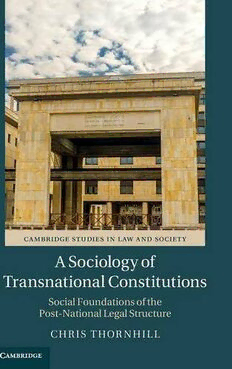
A Sociology of Transnational Constitutions: Social Foundations of the Post-National Legal Structure PDF
Preview A Sociology of Transnational Constitutions: Social Foundations of the Post-National Legal Structure
Downloaded from https://www.cambridge.org/core. IP address: 139.227.245.96, on 20 Oct 2017 at 05:16:03, subject to the Cambridge Core terms of use, available at https://www.cambridge.org/core/terms. https://www.cambridge.org/core/product/0B1FE7A20118F3C3D938A51E261959B3 A SOCIOLOGY OF TRANSNATIONAL CONSTITUTIONS ThisbookisthesecondinaseriesofvolumesontheSociologyofConsti- tutions.Thisvolumefocusesontheriseoftransnationalconstitutional laws,primarilycreatedbytheinteractionbetweennationalandinterna- tional courts and by the domestic transformation of international law. Through detailed analysis of patterns of institutional formation at key historical junctures in a number of national societies, it examines the social processes that have locked national states into an increasingly transnational constitutional order, and it explains how the growth of globalconstitutionalnormshasprovidedastabilizingframeworkforthe functionsofstateinstitutions. The book adopts a distinctive historical–sociological approach to thesequestions,examiningthedeepcontinuitiesbetweennationalcon- stitutional law and contemporary models of global law. The volume makesanimportantcontributiontothesociologyofconstitutionallaw, tothesociologyofpost-nationallegalprocessesandtothesociologyof humanrightslaw. chris thornhillisProfessorofLawattheUniversityofManchester. His research is mainly focused on the sociology of constitutional law, both in domestic and transnational contexts, and he has published a number of influential works in this area. His work has been published in many languages, including Chinese, Japanese, Spanish, German, andRussian. Downloaded from https://www.cambridge.org/core. IP address: 139.227.245.96, on 20 Oct 2017 at 05:16:03, subject to the Cambridge Core terms of use, available at https://www.cambridge.org/core/terms. https://www.cambridge.org/core/product/0B1FE7A20118F3C3D938A51E261959B3 CAMBRIDGE STUDIES IN LAW AND SOCIETY Cambridge Studies in Law and Society aims to publish the best schol- arly work on legal discourse and practice in its social and institutional contexts,combiningtheoreticalinsightsandempiricalresearch. Thefieldsthatitcoversarestudiesoflawinaction,thesociologyoflaw, theanthropologyoflaw,culturalstudiesoflaw,includingtheroleoflegal discoursesinsocialformations,lawandeconomics,lawandpoliticsand studies of governance. The books consider all forms of legal discourse acrosssocieties,ratherthanbeinglimitedtolawyers’discoursesalone. The series editors come from a range of disciplines: academic law, socio-legalstudies,sociologyandanthropology.Allhavebeenactively involvedinteachingandwritingaboutlawincontext. Serieseditors ChrisArupMonashUniversity,Victoria SallyEngleMerryNewYorkUniversity SusanSilbeyMassachusettsInstituteofTechnology Alistofbooksintheseriescanbefoundatthebackofthisbook. Downloaded from https://www.cambridge.org/core. IP address: 139.227.245.96, on 20 Oct 2017 at 05:16:03, subject to the Cambridge Core terms of use, available at https://www.cambridge.org/core/terms. https://www.cambridge.org/core/product/0B1FE7A20118F3C3D938A51E261959B3 A SOCIOLOGY OF TRANSNATIONAL CONSTITUTIONS Social Foundations of the Post-National Legal Structure Chris Thornhill Downloaded from https://www.cambridge.org/core. IP address: 139.227.245.96, on 20 Oct 2017 at 05:16:03, subject to the Cambridge Core terms of use, available at https://www.cambridge.org/core/terms. https://www.cambridge.org/core/product/0B1FE7A20118F3C3D938A51E261959B3 UniversityPrintingHouse,CambridgeCB28BS,UnitedKingdom CambridgeUniversityPressispartoftheUniversityofCambridge. ItfurtherstheUniversity’smissionbydisseminatingknowledgeinthepursuitof education,learningandresearchatthehighestinternationallevelsofexcellence. www.cambridge.org Informationonthistitle:www.cambridge.org/9781107038523 (cid:2)C ChrisThornhill2016 Thisworkisincopyright.Itissubjecttostatutoryexceptionsandtotheprovisionsofrelevant licensingagreements;withtheexceptionoftheCreativeCommonsversionthelinkforwhichis providedbelow,noreproductionofanypartofthisworkmaytakeplacewithoutthewritten permissionofCambridgeUniversityPress. Anonlineversionofthisworkispublishedathttp://dx.doi.org/10.1017/CBO9781139833905 underaCreativeCommonsOpenAccesslicenseCC-BY-NC4.0whichpermitsre-use, distributionandreproductioninanymediumfornon-commercialpurposesproviding appropriatecredittotheoriginalworkisgivenandanychangesmadeareindicated.Toviewa copyofthislicense,visithttps://creativecommons.org/licenses/by-nc/4.0. Allversionsofthisworkmaycontaincontentreproducedunderlicensefromthirdparties. Permissiontoreproducethisthird-partycontentmustbeobtainedfromthesethird-parties directly. Whencitingthiswork,pleaseincludeareferencetotheDOI10.1017/CBO9781139833905 Firstpublished2016 AcatalogrecordforthispublicationisavailablefromtheBritishLibrary ISBN978-1-107-03852-3Hardback CambridgeUniversityPresshasnoresponsibilityforthepersistenceoraccuracy ofURLsforexternalorthird-partyinternetwebsitesreferredtointhispublication, anddoesnotguaranteethatanycontentonsuchwebsitesis,orwillremain, accurateorappropriate. Downloaded from https://www.cambridge.org/core. IP address: 139.227.245.96, on 20 Oct 2017 at 05:16:03, subject to the Cambridge Core terms of use, available at https://www.cambridge.org/core/terms. https://www.cambridge.org/core/product/0B1FE7A20118F3C3D938A51E261959B3 ForAtina,andforGraceandJohn Downloaded from https://www.cambridge.org/core. IP address: 139.227.245.96, on 20 Oct 2017 at 05:16:03, subject to the Cambridge Core terms of use, available at https://www.cambridge.org/core/terms. https://www.cambridge.org/core/product/0B1FE7A20118F3C3D938A51E261959B3 Downloaded from https://www.cambridge.org/core. IP address: 139.227.245.96, on 20 Oct 2017 at 05:16:03, subject to the Cambridge Core terms of use, available at https://www.cambridge.org/core/terms. https://www.cambridge.org/core/product/0B1FE7A20118F3C3D938A51E261959B3 CONTENTS Acknowledgements pageviii Citingthiswork x Introduction 1 1 Thenationalpoliticalsystemandtheclassicalconstitutional formula 31 2 Constitutionalrightsandtheglobalpoliticalsystem 69 3 Theconstitutionofinternationallaw:Asociological approach 102 4 Thecrisisofsocialinclusionandtheparadoxofthenation state 130 5 Constitutionalrightsandtheinclusionofthenation: SystemictransformationsI 163 6 Constitutionalrightsandtheinclusionofthenation: SystemictransformationsII 231 7 Theautonomyofthepost-nationallegalstructure:The auto-constituentconstitution 366 Conclusion 419 Bibliography 430 Index 506 vii Downloaded from https://www.cambridge.org/core. IP address: 139.227.245.96, on 20 Oct 2017 at 05:16:03, subject to the Cambridge Core terms of use, available at https://www.cambridge.org/core/terms. https://www.cambridge.org/core/product/0B1FE7A20118F3C3D938A51E261959B3 ACKNOWLEDGEMENTS Much of the research for this book was funded by a grant from the European Research Council (Advanced Grant: 323656-STC). This grant provided me with quite unique academic opportunities, and I am immensely grateful to the ERC for this support. I am also grate- ful to the researchers that I have been able to employ because of this grant: Carina Calabria, Jessica Carlisle, Rodrigo Cespedes, Dominic Dagbanja, Gianluca Gentili, Wim Muller, Elizabeth O’Loughlin and Maria Smirnova. Our collaboration has been both pleasurable and at timesdeeplyenlightening. Researchforthisbookwasconductedinmanylocations,inEurope, LatinAmericaandAfrica,andIwouldliketothankeveryonewhohas assistedmealongtheway.Ihaveoftenbeeninspiredbythejudgesand lawyersthatIhavemetindifferentsocieties,andIhopethatmyadmi- rationfortheirattemptstoconstructsolutionsfortheattimesintensely challengingproblemswhichtheyhavefacedisevidentthroughoutthis book. My special gratitude is due to the academic and administrative staff at the Max-Planck-Institut fu¨r europa¨ische Rechtsgeschichte in FrankfurtamMain.TwoextendedstaysattheInstitute,amagnificent placetoundertakefocusedacademicresearch,enabledmetowritesome ofthehistoricalsectionsofthisbook. Preliminarypaperscontainingsomeoftheresearchinthisbookhave beenpresentedatmanyseminars,lecturesandconferences,anditisnot possible for me to thank all the people whose commentaries and crit- icisms have influenced its development in such contexts. However, I receivedparticularlystimulatingfeedbackfollowingresearchpresenta- tionsattheHumboldtUniversita¨tinBerlin(May2013),attheJohann WolfgangGoetheUniversita¨tinFrankfurtamMain(December2013), at Copenhagen Business School (January 2014), at Unisinos in Sa˜o Leopoldo (August 2014), at the Universita¨t Bremen (October 2014) and at the Instituto de Cieˆncias Sociais da Universidade de Lisboa (April2015).Iwouldliketothankallparticipantsintheseeventsfor viii Downloaded from https://www.cambridge.org/core. IP address: 139.227.245.96, on 20 Oct 2017 at 05:16:03, subject to the Cambridge Core terms of use, available at https://www.cambridge.org/core/terms. https://www.cambridge.org/core/product/0B1FE7A20118F3C3D938A51E261959B3
